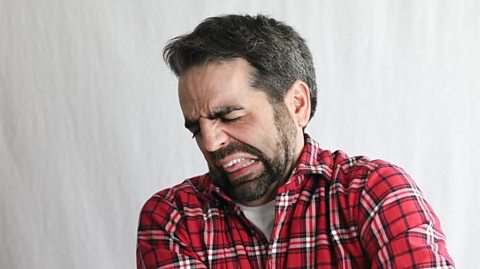For some people, thereтs nothing like squeezing a spot and witnessing the aftermath.
If you agree with that statement, even if a shiver went through you, youтre not alone. From playing with pimple-popping toys to watching hours of cringe-inducing videos, many people are drawn to things that make you go ugh.
So why do some of us like gross stuff? Dr Val Curtis, director of the Environmental Health Group (or тdisgustologistт, as she calls herself) at the London School of Hygiene and Tropical Medicine explains the purpose of being disgusted - and why we might like it.
But, if you have a weak stomach, be warned: potentially gross themes lie ahead.
Disgust goes way back
So why do we feel icky when we see something sticky? Dr Curtis says itтs in our genes: had our ancient ancestors not felt disgust, they would have eaten or touched things they shouldnтt have.
тItтs genetic in the sense that we all have these natural motives to avoid disgusting things, to avoid fearful things, and go towards good things such as food,т she says.
The disgust response kept our ancestors safe from harmful bacteria in rotting food, toxic water, waste and dead animals. Humans with a strong sense of disgust not only stayed healthier, but would have been seen as a more attractive mate and passed on those тdisgust genesт to their offspring.
тThose who had a тhealthy squeamishnessт would have gone on to have more children and practised good hygiene, and that would have protected their children,т says Dr Curtis. тThose who didnтt have that squeamishness would have simply died out.т

The signs
How do you know when you just dislike something and when youтre disgusted by it?
тDisgust is specifically about things that might make us sick,т says Dr Curtis. тYou might dislike the taste of cheese, but itтs not going to necessarily make you sick. You might be disgusted by the sight of a cockroach sitting on that plate of cheese - because the cockroach has probably come out of the toilet and is carrying pathogens on its feet.т
You can tell if itтs a disgust response if you have a physiological reaction. Dr Curtis says the steps of disgust are:
- Paying attention: You stop what youтre doing and have a good look at the thing to assess it, without getting any closer.
- Squirming or sweating: Your palms go clammy, your hands go up and you stay away from touching the thing - or dropping it if you ignored step one.
- Pulling a face: Sticking your tongue out or closing your mouth up tight - your tongue is simulating pushing the thing out of your mouth and keeping it out, just in case.
- Gagging: Especially if itтs a food-related disgust response, your stomach starts to churn to discourage you from ingesting it, and prepare you to throw up in the event you did. This is what we know as gagging.
Now you know the signs of a disgust response, see if you can finish the rest of this article without feeling it!

Y-eww are in control
So why on Earth would we seek out feeling like a sweaty, nauseous mess?
тIf youтre a small primate, itтs really important to learn things - to learn whatтs frightening, to learn whatтs disgusting,т says Dr Curtis. тWe all seek out opportunities to learn - and thatтs called play.т
A similar theory of why we have nightmares, such as being chased, is that it prepares us for a scary situation and sharpens our fight or flight instincts for when weтre awake. Itтs likely to be the same when seeking out disgusting scenarios.
тItтs similar to the fear response. Weтre attracted to roller coasters, for example, because itтs really nasty and scary, but you learn what it is to be frightened. We all have a drive to play, and try out things safely.т
This is the reason you might pop a pustule when you know itтs going to be a pus-filled mess, or lift the lid up on a bin and take a sniff when you know itтs going to smell unpleasant. Your brain is interested to see what happens in a situation that isnтt dangerous, and record it for when тrealт circumstances might occur.
тYouтre practising to see what happens,т Dr Curtis continues. тSmall children put their finger in their poo and lick it - but no one does it again!т

Disgust gets under your skin
Weтve probably all uttered the phrase тThat makes my skin crawl!т at some point in our lives. When it comes to disgust, itтs not just a saying.
тImagine your hairтs full of lice,т says Dr Curtis. тYouтre going to start scratching, youтre going to feel really, really itchy. Thatтs another disgust response - youтre actually going to stick your nails in your hair and pull the lice out.т
This is potentially yet another evolutionary leftover around ectoparasites - parasites that might bite or burrow into you from the outside, such as lice, fleas or bedbugs.
тThe other reason that we like popping our spots is that in our evolutionary past there were lots of bugs that would burrow into our skin. So when youтve got a spot, it looks a bit like youтve got a parasite - your natural response is to squeeze it and get rid of it.т
Feeling itchy yet? This might be the reason we like a good scratch and a squeeze when we see or hear about something disgusting. The brain has been shown to release dopamine (a тpleasure chemicalт) upon squeezing a spot, combined with the physical sensation of pressure-relief.
тItтs not just about play - it is actually very satisfying, because itтs a good thing to get rid of this disgusting parasite thatтs trying to eat you from inside,т Dr Curtis continues.

Can you overdo the ew?
While it might make your primate brain feel good to pop that pimple, it doesnтt mean that you should. Given that itтs very likely not a parasite (and if it is, you should go to a GP), thereтs no reason to squeeze it, and a dermatologist may advise you to leave it alone.
Spot-popping can become a problem if it leads to compulsive skin-picking or over-grooming. An example could be obsessively plucking hairs, or scrubbing yourself clean to the point where not doing it causes anxiety. Excessive skin-picking in particular can result in permanent scarring and deep pock marks (pits on the skin left by burst chickenpox blisters, acne or spots).
Dr. Curtis says the disgust response exists on a bell curve: тThere are a small number of people who are very high on it, and there are a small number of people who are very low on the scale and might not groom at allтІ Most people are in the middle.т
People at the top end of the scale with a very high level of disgust can experience problems that affect their daily life. For example they can develop cleaning disorders, an aversion to touch or intimacy with other people for fear of getting sick, or in some extreme cases, agoraphobia.
The opposite can also be a problem. If people with a very low disgust response become acclimatised to unhygienic conditions, it can not only be a threat to their health and expose them to harmful pathogens, but also might be socially off-putting.
Never fear! Bitesize has a handy guide on how often you should wash yourself (and your things!) here.
Why do we yawn? And four other bodily functions explained
We take a look at the weird things our bodies do on a daily basis.

A potted history of the toilet
Admit it, most of our best thinking is done while perched on the loo.

Quizzes
Having a revision break? Take one of our quizzes!
